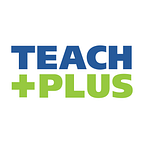Reciprocity Between School and Home Life Is Key to Preparing Young Children for School
By Erica Coves Fuentes
“What are the skills your students need to have by the time they come to your Pre-K class so they can meet 3rd grade literacy and numeracy success?” the moderator asked me. “They need to be potty-trained and able to produce two-word sentences,” I responded. The audience of the 2022 Educate Texas Policy Convening looked shocked. “What is she talking about?”
Kids. I am talking about kids. Specifically, a poor start for kids and the effect this has from the teaching workforce perspective.
Last year, Rebecca, Tommy, Manuel, Sasha, Inez, and Roberto, all capable and intelligent kids, were non-verbal when they joined my class. This means they were unable to communicate when they needed to go to the bathroom, among other things. Their lack of exposure to developmentally appropriate communicative situations such as storytelling, role-playing and problem-solving at home caused them to lag behind in the language development timeline.
“Can you cross your fingers and raise your hand high so I know you need to use the restroom?” I used to ask them. There would be no response from the children. This is very frustrating for both students and teachers. Students feel bad because they cannot express themselves and struggle to process simple commands. Educators feel bad because we have to coach students in the very basic socio-emotional and physical skills children should’ve been equipped with before coming to school. This tutelage comes at the expense of teaching actual curriculum content and doing the important work of creating a solid basis for young children prior to entering kindergarten. Without internalizing the foundations, such as ways of expressing their needs and feelings with words, and mastering control of their bathroom needs, my students are not ready to move on.
The Texas Infant, Toddler and Three-Year-Old Early Learning Guidelines specify that 3-year-olds should be able to dress and undress themselves with minimal assistance, express emotions and needs through words, and be able to speak about familiar places and activities prior to entering Pre-K. About one-fourth of my pupils cannot. The classroom-observable consequences of not being ready for this new stage are mainly dependency and frustration.
To better prepare our young learners for school, we must include families in the teaching and learning process by inviting them into our classrooms. At a school I worked at previously, I implemented a Learning Communities Methodology where families visited my classroom fortnightly and took charge of teaching the curricular content of the day, such as letters, sounds, numbers, shapes, animals, and feelings, with guidance from our staff. The work included four different workshops with hands-on activities based on the development of both motor skills (fine and gross) and communicative competences (listening and speaking). Throughout, not only did our families gain perspective on the school system, but they also acquired skills to help their children learn and grow.
I couldn’t have been more thrilled about the program’s outcomes. Some of the comments I got from my families at the end of the nine-month project were: “I learned it is important to create communicative situations for my child to have an opening to express himself.” “I realized that the more varied input we provide, the more output my daughter will be able to produce.” “I learned the value of organization and readiness as key elements of the educational process.” “I witnessed the improvement of my kid’s at-home behavior since we both learned how to express our needs.” As a teacher, this was one of the most fulfilling and successful programs I have ever participated in.
There is no doubt that engaging families can help close gaps when it comes to children’s developmental timelines. Programs such as the one I implemented can create powerful bridges and establish reciprocity between school and home. Raising awareness and insight into young children’s development process with their parents and motivating them to be more involved benefits everyone. If such a methodology were implemented across our pre-K classrooms, the next time I’m asked, “What are the skills your students need to have by the time they come to your Pre-K class?” I might have a different response: “They just need to be ready to participate in class and have fun with their peers. We will create a constructive learning environment with the close help of our loved ones.”
The workforce of the future deserves access to high-quality early childhood education and we teachers are ready to provide it.
Erica Coves is a pre-k bilingual teacher at Janowski Elementary School in Houston. She is a 2021–2022 Teach Plus Texas Policy Fellow.
